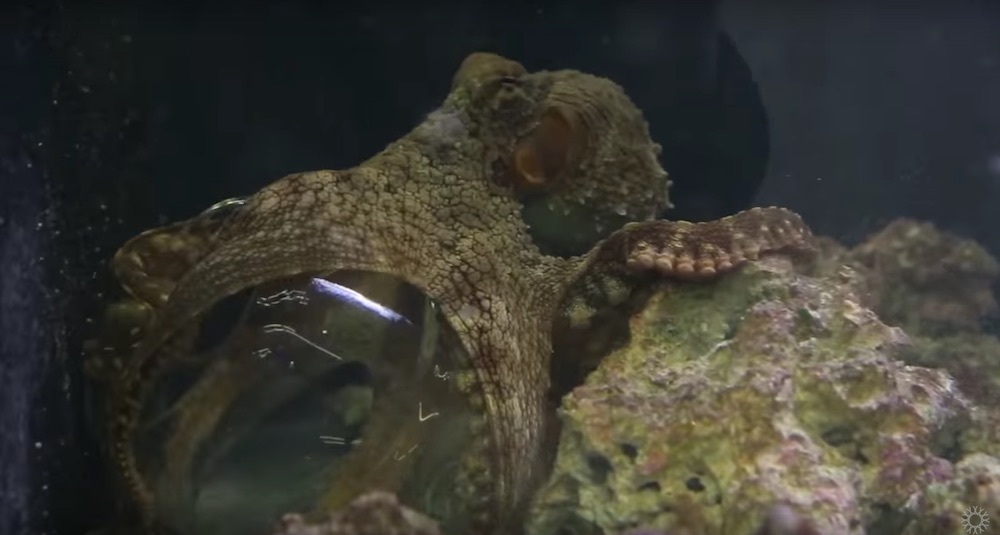
Humans aren't the only species that need a mental workout. It turns out that octopuses need to flex their eight-limbed brain cells, too.
An amazing new video shows an octopus at the California Academy of Sciences in San Francisco solving a puzzle to get at tasty shrimp inside a hamster ball. This type of mental stimulation keeps the well-armed creatures from becoming depressed.
"Octopuses in general are highly intelligent and naturally inquisitive animals," said Patrick Lee, a biologist and husbandry manager at the California Academy of Sciences, who helps keep the creatures' minds sharp with a variety of exercises. "In the wild, they use this intelligence and their curiosity to help them solve problems and to look for food. Being in captivity, things can get a little bit boring at times."
"We fill the hamster ball w/shrimp as a form of enrichment, & day #octopus takes 15 mins–an hour to figure it out!" https://t.co/HTPA0TYFga
— CA AcademyOfSciences (@calacademy) November 5, 2015
Highly intelligent
In the wild, octopuses use a variety of clever tactics to hunt prey, from camouflaging themselves as a coral or a rock, to squeezing into tight spaces to flush out prey. Having the mental flexibility to quickly adapt their strategy takes some smarts, Lee said.
Sign up for the Live Science daily newsletter now
Get the world’s most fascinating discoveries delivered straight to your inbox.
As a result, octopuses can be frighteningly intelligent. (Seriously, why has nobody made a movie yet about an evil-genius octopus?) The eight-armed creatures may be able to use tools, with some being observed collecting coconut shells and using them for shelter when threatened. In Germany, one particularly precocious aquarium octopus, named Otto, was so annoyed with a 2,000-watt light bulb shining into his tank that he figured out that squirting water on it disrupted the whole electrical circuit, causing blackouts as a result, the Telegraph reported.
Unlike humans, however, most of an octopus' neurons are not in its head — rather they are distributed in its arms, so the cephalopod's intelligence is more like the Internet and less like the human brain that operates as a central processing unit, one researcher previously told Live Science. [The 5 Smartest Non-Primates on the Planet]
Training in captivity
Those cephalopod smarts can be a liability in aquariums, where octopuses may not have ot do much work to get food. If they aren't stimulated, the marine hunters can get depressed, interacting less with their trainers and becoming sluggish, Lee said.
To counteract the aquarium doldrums, trainers use a variety of tactics.
"It's actually a really interesting part of my job to keep up with challenging these guys. It forces me to think creatively," Lee told Live Science.
To do that, Lee deploys an arsenal of playthings, from dog chew toys to hamster balls. In the recent video, one of the two octopuses at the academy manipulates a hamster exercise ball. Inside are shrimp, and slits all around the ball allow the octopus to get teasing tastes. The task? The octopus must unscrew the top in order to actually eat those shrimp.
It's a job that even the smartest Fido or Fluffy companion couldn't solve, but it is light work for the octopus, thanks to its incredible arms.
"Their arms are almost analogous to our fingers to allow them to have that type of ability to open jars or lids," Lee said.
The trainers also try to satisfy the animals' tactile cravings by stroking their mantle or limbs, Lee said.
"They have quite a few taste buds on their arms, where they can touch and taste my arms," Lee said. "They enjoy them."
Follow Tia Ghose on Twitter and Google+. Follow Live Science @livescience, Facebook & Google+. Original article on Live Science.

Tia is the managing editor and was previously a senior writer for Live Science. Her work has appeared in Scientific American, Wired.com and other outlets. She holds a master's degree in bioengineering from the University of Washington, a graduate certificate in science writing from UC Santa Cruz and a bachelor's degree in mechanical engineering from the University of Texas at Austin. Tia was part of a team at the Milwaukee Journal Sentinel that published the Empty Cradles series on preterm births, which won multiple awards, including the 2012 Casey Medal for Meritorious Journalism.









